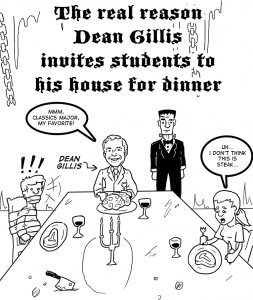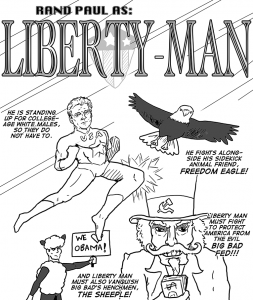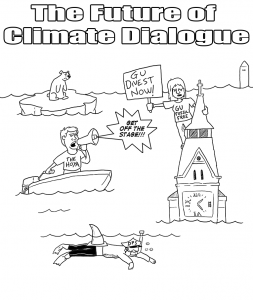“Jeffrey, stop that. We talked about this.”
His mother’s quick hiss was harsh and familiar, and Jeff reflexively looked down at his arm. He hadn’t even realized he’d been slowly digging his fingernails into his flesh, but he never did. It was a nervous habit as old as he could remember, one of many, but this one most frequently came out to play during these traditional Whitman family Sunday brunches at the club. He moved his left hand away and examined the pink, crescent-shaped welts on his right forearm. It was getting worse. He began scratching at his pastel blue tie, silently, so as to not set off his mother’s radar again.
Not that she was going to notice. She’d already dived right back into vapid conversation with his older sister, heartlessly gossiping about Mrs. Flynn, who sat with her own daughter in the opposite corner of the dining room. “I admire her nerve,” Mrs. Whitman mused. “To keep coming here with her head high. Even though everyone knows.”
“That poor woman,” Kelsey replied without a single note of empathy. “Even after the nose job, I guess he still thought his secretary was better-looking.”
Jeff let his eyes wander at the rest of the club members, expertly tuning the conversation out. He’d heard it all already. Club gossip, fashion commentary, maybe a tale of Kelsey’s latest trip to the Cape to visit Jay, her boyfriend of three years whose grandmother was a Vanderbilt. His father stood a few feet away, sipping his cocktail and chatting with Mr. Banks, the two of them proving that the best way to debate health care reform is to have the same opinion as your opponent.
This was why he hated going home. It was the same surgically-modified faces, the same salmon-colored conversation, the same parade of air-kisses and Southside cocktails and “how’s young Cutler Jr. enjoying Harvard?” that he’d been watching and hearing since he was an infant, already wearing white shorts and spending his summers at tennis camp. It was by some grace of God that he’d convinced his parents to let him leave the East Coast for college, not to go straight from boarding school to Princeton like the rest of the Whitman men. Not that Princeton had really been an option, he’d made sure of that. Amid the shockwaves that rocked the family after his rejection letter, the phone calls to the admissions office and threats of halted donations, nobody had bothered to look at the application and notice the inexcusable mediocrity of his essay, the lack of his family’s alumni history, and a truncated list of extra-curricular activities. Even though he eventually received a personal letter of acceptance and apology from the dean of admissions (who pacified the family by assuring them that the unfortunate soul responsible for Jeff’s rejection had been “removed from his position”), the damage had been done, and he’d played on his parents’ unflinching pride to sell them on Stanford, which had thought him good enough the first time around. And there he’d basked the freedom of the unfamiliar, worlds away where no one recognized him as the son of Andrew Whitman of the Whitman Group, and nobody had ever heard of the incestuous, provincial universe that was the Lakeway Golf Club. Coming back was like time travel. He was suddenly reverted to his angsty fourteen-year-old self, shoehorned into a jacket and tie and silently gnawing the inside of his lip while he contemplated small ways to shock his parents, knowing he’d never have the balls to try a single one of them.
His gaze had landed on the opposite wall, and he was jerked from his thoughts when their waitress kicked through the kitchen door, holding a tray of drinks with both hands. She was new this season, but had been serving his family at every brunch. He watched her as she smoothly, though not very gracefully, navigated through the tables to get to the Whitmans’. An insolent strand of her long, wavy brown hair had fallen out of her ponytail across her cheek, and she blew upward at it from her bottom lip, trying in vain to get it off her face. Her tray wobbled.
The first thing Jeff had noticed at the beginning of the summer was how uncommonly pretty she was. Definitely not club-member pretty: her big, emphatic brown eyes and extra holes punched in her earlobes floated her above the sea of seersucker as much as her uniform polo and black apron. She had a spattering of sunburn across her nose that was new this week, which he suspected didn’t happen at her family’s private beach in the Hamptons. Besides, country club girls never burned: the mere thought of someday having a wrinkle was enough to send them diving under a Tommy Hillfiger sun hat and putting another emergency aesthetician on speed dial. Plus everybody knows tan looks so much better under blonde hair and white sundresses. He kept watching her as she approached the table, obviously fishing her distracted mind for which drink went to which Whitman.
He found himself contemplating that, despite that he saw her once a week, he knew very little about the waitress aside from her striking appearance. He knew from her required shiny gold pin that her name was Andrea. He guessed that she was around his age. He knew that she’d had a boyfriend, a disheveled brown-haired kid, who would pick her up in his tan Toyota Camry after her shift every Sunday. He also knew that this had abruptly stopped happening two weeks ago, around the same time he overheard a too-loud conversation at the servers’ station in which she referred to someone named Ben with a kaleidoscope of expletives that no good Lakeway girl could have picked up at Andover. He knew that his father thought the ratio of grape soda to ginger ale in her Transfusions was off. He knew that she always had another member of the waitstaff tie her shoes for her. He knew she had a habit of tapping her pen against the silver ring on her right hand when waiting for a table to order, and wondered if even she was aware of it.
Warily, Andrea placed an iced tea in front of Kelsey, and had barely removed her hand before Mrs. Whitman had her bony, diamond-laced fingers around the bottom of the glass. She slid it in front of her own place setting, not even dignifying the waitress with a direct address. “She’s confused again,” she said to Kelsey, removing the lemon from the side of her glass and placing it on the tablecloth. “I ordered the iced tea.” Jeff looked up at Andrea for a reaction, and watched her eyes narrow with ire as she mumbled a word of apology and finished passing the drinks. She took out her check pad, and immediately began tapping her pen more quickly than usual against her blue-polished finger. Mrs. Whitman, slow and deliberate, opened her menu, a pretense since she always ordered the same chef’s salad, hold the bacon and dressing on the side.
He wasn’t sure why he did it. He certainly didn’t have any premeditated plans. It was a wave of spontaneity, spawned by twenty years’ worth of pressure-cooked frustration and resentment sent violently bubbling to the surface in the course of a few Sunday brunches. The result of Mr. Whitman’s passive, booze-pacified stare down at his menu, ignoring the disgusting superiority that oozed from his trophy-wife’s every pore, and the way Kelsey still wore a striped headband in her straight blonde hair the same way she had every day since she was five. Jeff abruptly and defiantly stood up from his seat, his chair making a loud, unpleasant scraping noise as it shot backwards. He was standing next to the waitress, and he looked his mother dead in the eye.
“Mom, Dad,” he said loudly, his heart accelerating with unfamiliar adrenaline. “This is my girlfriend, Andrea.”
To be contined in next week’s issue…
Jeff Whitman
October 8, 2010





love the salmon-colored conversation, the thin hands, and the personification of the loose strand of wavy hair — but I hope he isn’t using her